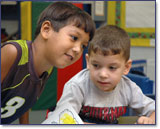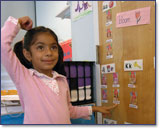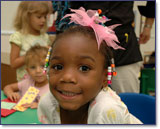|
 So, what is emergent literacy? Emergent literacy comprises the essential skills, knowledge, and attitudes that prepare children for the formal reading and writing instruction they will encounter in kindergarten and first grade. So, what is emergent literacy? Emergent literacy comprises the essential skills, knowledge, and attitudes that prepare children for the formal reading and writing instruction they will encounter in kindergarten and first grade.
Emergent literacy skills are the basic building blocks of learning to read and write. Children acquire emergent literacy skills through their interactions with adults and their environments. While these skills begin to develop in early infancy, preschool programs provide powerful opportunities for young children who might not otherwise have the opportunity to master these essential building blocks that contribute to later success in school.
 Recent research has highlighted the fact that early reading achievement is influenced most strongly by the quality and richness of children’s early experiences with print and language. That is, what we once attributed to children’s inherent abilities or the special talents they were born with was actually a result of their previous experiences and opportunities. We now know that early language and literacy experiences have more influence on children’s early reading achievement than family incomes, ethnicity or race, culture, home language, or other physiological factors. It is clear that effective preschool programs can prepare all children for success in school and in becoming readers and writers. Recent research has highlighted the fact that early reading achievement is influenced most strongly by the quality and richness of children’s early experiences with print and language. That is, what we once attributed to children’s inherent abilities or the special talents they were born with was actually a result of their previous experiences and opportunities. We now know that early language and literacy experiences have more influence on children’s early reading achievement than family incomes, ethnicity or race, culture, home language, or other physiological factors. It is clear that effective preschool programs can prepare all children for success in school and in becoming readers and writers.
 The goal of this training is to give you specific strategies and tools for preparing all children to experience early success in learning to read and write. The goal of this training is to give you specific strategies and tools for preparing all children to experience early success in learning to read and write.
Three areas of emergent literacy skills are related to later reading and writing achievement and are directly tied to how well children will be reading by the end of first grade. These areas are oral language, print knowledge, and phonological awareness.
 Research studies have found that children's abilities to identify and write their own names, identify and write some alphabet letters, knowledge of key concepts about print, awareness of the sounds of language or phonological awareness, vocabulary development, and the ability to retell stories with well-formed narrative structures are instrumental in early success in learning to read and write. Research studies have found that children's abilities to identify and write their own names, identify and write some alphabet letters, knowledge of key concepts about print, awareness of the sounds of language or phonological awareness, vocabulary development, and the ability to retell stories with well-formed narrative structures are instrumental in early success in learning to read and write.
The challenge before us with the VPK Program is to prepare all children to succeed in kindergarten. Research shows that children starting kindergarten who are behind in essential emergent literacy skills are likely to stay behind throughout their school years.
 We cannot afford to let this happen. We know from research that there are specific ways preschool programs can help prepare children to succeed in kindergarten and experience success in learning to read. This training is a first step in making sure that all prekindergarten providers understand what the essential language and emergent literacy skills are and how to support growth in these skills, knowledge, and attitudes in the prekindergarten classroom. We cannot afford to let this happen. We know from research that there are specific ways preschool programs can help prepare children to succeed in kindergarten and experience success in learning to read. This training is a first step in making sure that all prekindergarten providers understand what the essential language and emergent literacy skills are and how to support growth in these skills, knowledge, and attitudes in the prekindergarten classroom.
Florida has embraced the challenge of having every child reading and writing on grade level by the end of third grade. Florida’s educators want to do better now in developing reading achievement than we have ever done before. This training is designed to ensure that Florida's VPK Program can help children develop essential skills in language and communication and emergent literacy.
You are now ready to begin the Language and Communication Unit.
|